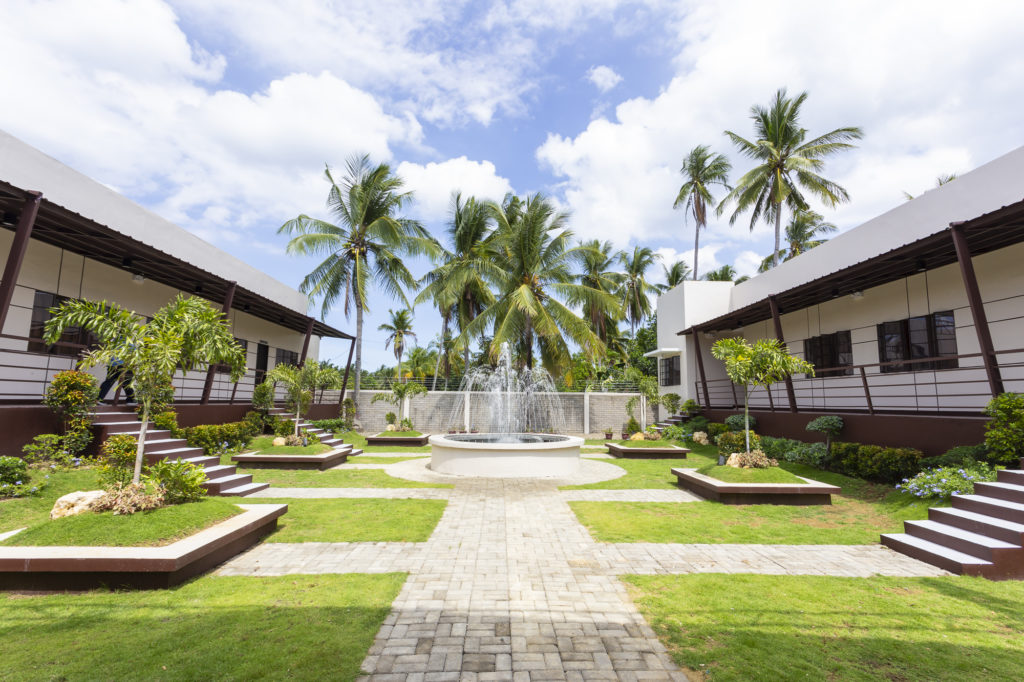
The garden area of the new drug rehabilitation and treatment center in Pinamungajan town. /Contributed Photo
CEBU CITY, Philippines – Exactly a week prior the International Day Against Drug Abuse and Illicit Trafficking, Globe Telecom turned over to the Cebu provincial government the first-of-its-kind drug rehabilitation and treatment center in Pinamungajan, Cebu in support of the national agenda to help former victims of drug abuse recover from addiction and become productive citizens.
“We are very thankful to Globe for providing us with this state-of-the-art facility that is conducive to the patients’ proper healing and rehabilitation. With the continuous success of the President’s war against illegal drugs, our country needs more establishments like this to extend holistic care to patients. This way, we can help them in the recovery process and in their reintegration back to their respective communities,” said outgoing Cebu Governor Hilario Davide III.
Yoly Crisanto, Globe Chief Sustainability Officer and SVP for Corporate Communications, on the other hand, said: “We are one with the government in nation building. By turning over this drug rehabilitation center to the Cebu provincial government, we hope to show our strong support to the administration’s efforts to rehabilitate victims of drug addiction and bring about positive changes to our society. We want to help save the lives of Filipinos and give them a chance for a better future.”
The psychiatric room of the drug rehab center. /Contributed Photo
Called the New Life Center, the building sits on a 2,600 square meter property owned by the Municipality of Pinamungajan under the jurisdiction of the Cebu provincial government. It has a total floor area of 930 square meters which can accommodate 106 beds to serve former drug dependent patients in Cebu and nearby provinces who need quality and comprehensive treatment. It has a separate male and female ward and a psychiatric ward composed of 18 single rooms for extreme cases.
The center also has a doctor’s office, a nurse’s station, treatment and stabilization room, kitchen, dining room, clinic, and a hotel-like reception area. It is the first provincial government-supervised facility in Cebu that is also adjacent to a district hospital – the Dr. Jose Ma. V. Borromeo Memorial District Hospital.
Globe will also provide internet connectivity to the facility’s offices to make it easier for doctors and medical staff to collaborate. Connectivity will also enable Virtualahan, a Davao-based social enterprise, to implement their online modules to selected former drug dependents. These modules are part of Globe and Virtualahan’s commitment to add value to the government’s existing drug rehabilitation process by helping patients become productive members of society again after their treatment through digital learning and upskilling.
The New Life Center is now ready to accommodate recovering drug addicts. /Contributed Photo
The company made sure that the building conforms to environmental standards to help reduce carbon emissions and optimize power consumption. The building is equipped with solar panel roof tiles that can produce electricity to provide support power for lights, fans, air-conditioning, and all other electrical appliances up to a certain limit during the day. The panels were carefully designed and installed by SolarSolutions, a social enterprise which focuses on providing renewable energy solutions that produce highly positive social, environmental, and economic value while at the same time provide added value through various community programs.
The facility also makes use of eco-pavers for the garden floors and recreation area, as well as, eco-bricks for the perimeter fences. The eco-bricks and pavers come from a combination of construction materials and waste plastic laminates which are produced by a social enterprise called Green Antz Builders, Inc.
It also has open spaces, gardens and a recreation room for indoor activities to help build a strong support community.
Cebu has about 50,000 drug offenders who have surrendered at the end of 2017, representing 2 percent of the total provincial population of 2.94 million. Currently, there are two rehabilitation facilities in Cebu located in Argao and Mandaue City but an additional drug rehabilitation facility will help address the growing need for treatment and care for victims.
The Philippines, under the current administration, has aggressively launched several campaigns to address drug-related problems due to the high number of Filipinos addicted to illegal drugs such as shabu, marijuana, rugby, solvent, cocaine, ecstasy, among others. The Dangerous Drugs Board estimated the number at about 3.7 million in 2016. /dcb